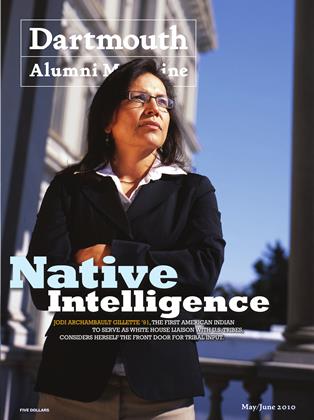Personal History
Ornamental as well as informative, old student scrapbooks spill forth a bounty of ephemera, nostalgia and beautiful garbage.
May/June 2010 JOE BABCOCK ’08Ornamental as well as informative, old student scrapbooks spill forth a bounty of ephemera, nostalgia and beautiful garbage.
May/June 2010 JOE BABCOCK ’08Ornamental as well as informative, old student scrapbooks spill forth a bounty of ephemera, nostalgia and beautiful garbage.
if you were a student at Dartmouth
between 1890 and 1950, chances are you would have kept a scrapbook. “I suspect that scrapbooking was a social, communal activity much like quilting,” says archivist Peter Carini. Special Collections has about 300 scrapbooks, many donated by the creator or his family. “Some donors seek immortality,” says Carini, “while some just can’t bring themselves to throw things away.” He acknowledges, however, that the contents of scrapbooks provide an interesting, if sometimes crinkled, peek at the past.
Most of the scrapbooks in Rauner are oversized, with thick leather bindings. Some are overstuffed and crumbling, others are tidy and organized with tiny photographs arranged and labeled in a perfect grid. Their contents trumpet Dartmouth’s seemingly unstoppable football team and announce speech contests and “Smoke Talks” on subjects such as “The Typical American” or a recent coal strike. Chock full of ticket stubs, hotel brochures, menus, even cigarette butts and bottle caps, the scrapbooks live up to the name.
Some are mundane—one student devotes a page to four editions of the College’s “Regulations of the Faculty.” Others include old bills and overdue library book notices.
“If you look closely you’ll see not all scrapbookers were good, upstanding citizens,” says Carini. In the scrapbook compiled by Robert Williams ’26—actually just a pile of papers stacked in the back of a binder—is a letter from a dean addressed to Williams’ father. “It is with sincere regret that I find myself under the necessity of informing you that your son has been separated from college because of his unsatisfactory record,” writes the dean. Did Mr. Williams ever receive the letter, or did his son somehow intercept it and stash it away?
Student scrapbooking declined as other social opportunities, such as the car, presented themselves, says Carini. On one hand it seems unlikely that Dartmouth students today would pursue the hobby. Then again, they have Facebook.
Harris scrapbooks Fred Harris, class of 1911, is Dartmouth’s champion scrapbooker: He neatly filled nine oversized volumes with grade reports, athletic results and even a piece of pigskin. Founder of the Dartmouth outing Club and Winter Carnival, Harris went on to become an investment banker in Brattleboro, Vermont.
and a bit of pretzel from a Crosby keg party (bottom). Blake became a professor of medicine and served as dean of yale Medical School from 1940 to 1947.
He won the United States of America Typhus Commission Medal in 1945 for his work in protecting American troops from typhus fever.
Snow Scrapbook Conrad Snow, class of 1912, kept the butt of his first cigarette in the pages of his scrapbook. Snow edited The D (his photo far right shows the “editorial room”) and went on to practice law and work as an assistant legal advisor for the State Department. In 1947 he denounced Senator Joseph McCarthy, leading The Washington Post to describe Snow as “a bureaucrat who will not be bullied.”
JOE BABCOCK is a high school writing instructor. He lives in Chicago.
 View Full Issue
View Full Issue
More From This Issue
-
 Cover Story
Cover StoryNative Intelligence
May | June 2010 By DIRK OLIN ’81 -
 Feature
FeatureArchitectural Digest
May | June 2010 By C.J. Hughes ’92 -
 ALUMNI OPINION
ALUMNI OPINIONReturn of the Critic
May | June 2010 By William Morgan ’66 -
 PERSONAL HISTORY
PERSONAL HISTORYHappy Feet
May | June 2010 By Anne Jakle ’03 -
 TRIBUTE
TRIBUTEFishing With George
May | June 2010 By Jim Collins ’84 -
 Interview
Interview“It’s Complicated”
May | June 2010 By Meg Sommerfeld ’90
Features
-
 Feature
FeatureThe President's Answers to Some Questions During Radio Interview
DECEMBER 1971 -
 Feature
FeatureThe Presidency
April 1975 -
 Cover Story
Cover StoryRobert Lincoln O'Brien 1891
NOVEMBER 1990 -
 Feature
FeatureWorkouts From Hell
Jan/Feb 2002 By BRAD PARKS ’96 -
 Feature
FeatureDrug Buster
Nov/Dec 2007 By CHRISTOPHER S. WREN ’57 -
 Cover Story
Cover StoryHOW TO HOOK VIEWERS WITH AN ADDICTIVE SOAP OPERA STORYLINE
Jan/Feb 2009 By JEAN PASSANANTE '75






